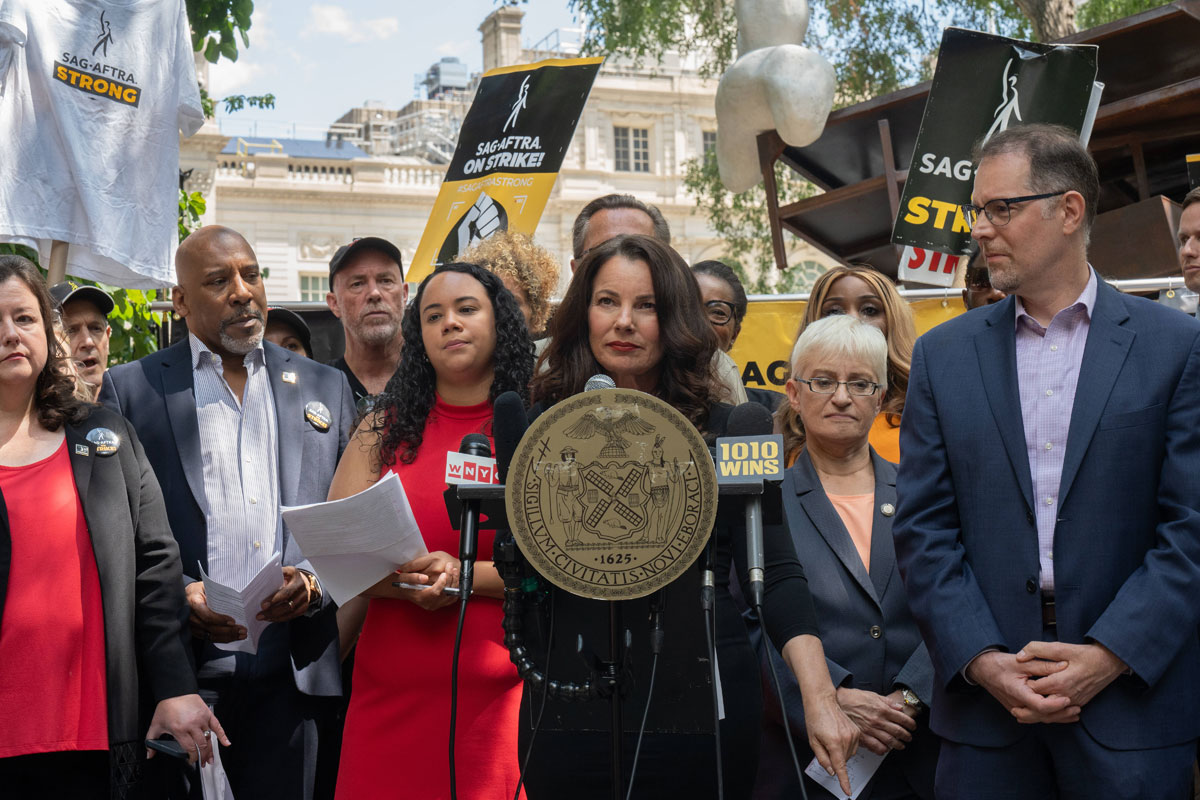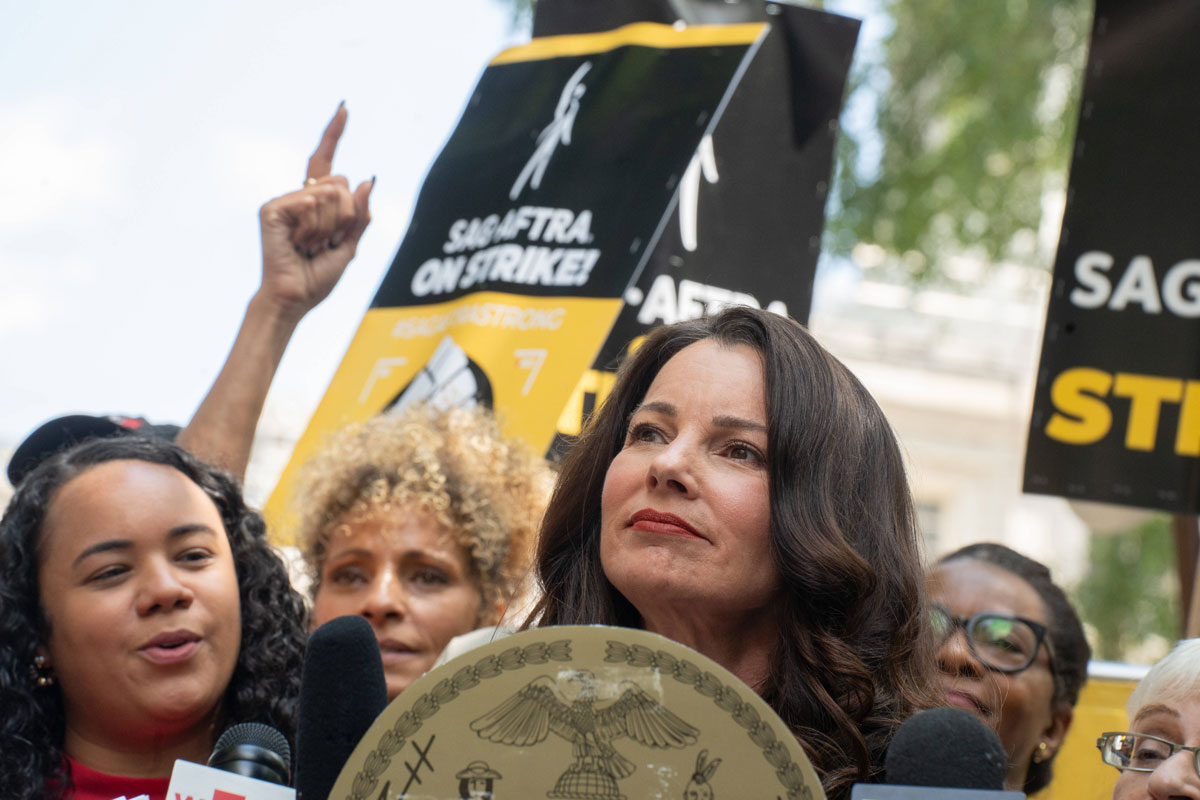SAG-AFTRA president Fran Drescher and chief negotiator Duncan Crabtree-Ireland are still basking in the glow of their victory of the new three-year contract with AMPTP, as they should. In describing the process she and Duncan had with AMPTP to get here, Fran noted “I think they realized they were facing a new kind of leadership… We deflected their intimidation tactics.” The strike officially ended after 118 days on November 9. Fran and Duncan held a press conference in LA on Friday to highlight the historic gains achieved. There was also mention of a certain movie star who called with congratulations.
A sort-of compliment from George Clooney: “George Clooney said, ‘I would have bet my house and lost that you couldn’t get the deal that you got, that you wouldn’t have gotten past a billion dollars.’ And, you know, that just made me so happy,” said Drescher, 66.
A comment from SAG-AFTRA: “There was so much meat on the bone that we did get,” [Drescher] said. “It is such a triumph, such an extraordinary contract with so much in it that makes it meaningful for the lives of all of our members and, really, for generations to come. That was also important, because I think that this is a historic time, and we needed a seminal negotiation to match it.” … The statement added, “We have arrived at a contract that will enable SAG-AFTRA members from every category to build sustainable careers. Many thousands of performers now and into the future will benefit from this work.”
A comment from AMPTP: “It gives SAG-AFTRA the biggest contract-on-contract gains in the history of the union, including the largest increase in minimum wages in the last 40 years; a brand new residual for streaming programs; extensive consent and compensation protections in the use of artificial intelligence; and sizable contract increases on items across the board. The AMPTP is pleased to have reached a tentative agreement and looks forward to the industry resuming the work of telling great stories,” AMPTP added.
[From People]
Geez, George could polish up his compliment-giving skills. He essentially said “I didn’t think you could do it!” But Fran is so slick here, casually name-dropping him. Meanwhile, The Washington Post had an interview with Fran and Duncan where they dug into the “meat on the bone” in the new contract:
The $1 billion deal: “More than $1 billion” in new wages and benefit plan funding over the three-year term of the contract. Crabtree-Ireland told The Post on Wednesday that figure represented “gains made in this contract over the existing contract.” … An immediate 7 percent wage increase for many performers, and an 11 percent increase for background actors. Those wages would increase again by smaller amounts in 2024 and 2025.
A new fund will be created for actors’ work on streaming shows: Crabtree-Ireland told The Post this week that the union pursued new ways to approach winning a significant share of streaming revenue. … “We were really looking to not only increase, but also to change the way that money is distributed in the streaming system, so that it becomes more sustainable for our members. The way that the business model has changed, and then the contracts had not kept up with, left our members in a very tight squeeze.” Drescher added that a primary goal in negotiating over streaming revenue was “how to compensate performers that are on that platform when there’s no tail of syndication,” unlike with “linear television.”
AI was the dealbreaker: At the news conference, Drescher … said the issue of artificial intelligence was one of the last and most difficult issues to be resolved, in light of widespread fears among actors that rapidly advancing technology will be used to simulate their likeness and eventually replace them. “AI was also a dealbreaker,” she said. “If we didn’t get that package, then what are we doing?” … She said that under the new agreement, SAG-AFTRA and the AMPTP will meet twice a year “to keep our finger on the pulse of technology like this, so that we can actually lock elbows on the same side and march into Washington to get federal regulations to protect us all against piracy.”
Informed consent on digital replicas: A requirement that actors — including background performers — give studios “informed consent” and get “fair compensation” for the creation of any digital replicas. That consent can’t be obtained at the front end — it has to be obtained at the time of use,” Crabtree-Ireland said. “It can’t just be a boilerplate sentence that says, ‘I give away the rights to use this replica in perpetuity throughout the universe.’ … It has to be a specific description of what the intended use is so that the performer can make an informed decision about whether they want to agree to that or not.”
Nanny Fine gets the last word: “This negotiation showed the AMPTP that we are contenders,” [Drescher] said in an interview. “Where we entered [as] the largest entertainment union in the world, we exited as also the most powerful.”
[From The Washington Post]
We knew from the beginning that streaming residuals and AI protections were the main issues at stake. The WGA started that conversation when they went on strike first, and they agreed on a very good contract in late September. Quite frankly I was surprised it took AMPTP a full month+ extra after making concessions to writers, to do the very same for actors on the very same points. Especially with AI being the final holdout — did AMPTP really think actors would back down when it was their image and likeness on the line? But there were some other protections secured in the new deal that I was pleasantly surprised to hear about. Namely, requirements for intimacy coordinators to be hired for any scenes with nudity or simulated sex, and for sets to have “proper hair and makeup services for all performers.” Meaning: no more making Black women apologize to hairdressers who don’t know how to do their jobs.
https://www.instagram.com/p/CyZaGBuJE9-/
https://www.instagram.com/p/CzjlKgGpEKA/
photos credit: IMAGO/Derek French / Avalon and via Instagram
Source: Read Full Article

